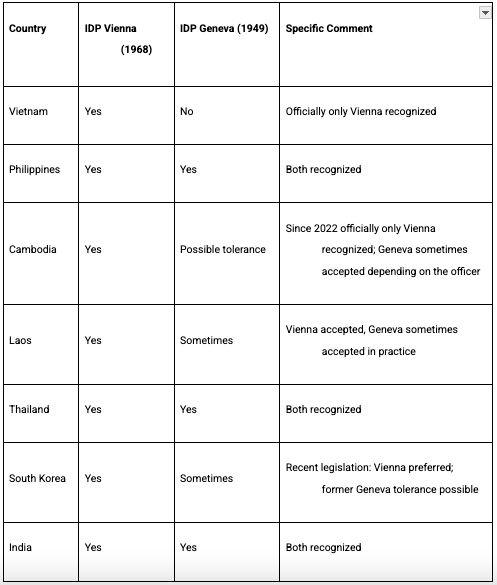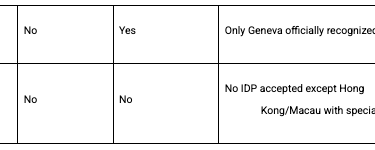Tables of countries signatory to the International Driving Permit Conventions – Vienna 1968 and Geneva 1949




Signatories of the Vienna Convention of 1968 (notable countries):
Albania
Germany
Armenia
Austria
Azerbaijan
Bahrain
Belarus
Belgium
Bosnia and Herzegovina
Brazil
Bulgaria
Cape Verde
Chile
Ivory Coast
Cuba
Denmark
Ecuador
Spain
Estonia
Finland
France
Georgia
Greece
Hungary
Indonesia
Iran
Iraq
Israel
Italy
Kazakhstan
Kuwait
Latvia
Lithuania
Luxembourg
Morocco
Mexico
Monaco
Mongolia
Montenegro
Myanmar
Niger
Norway
Uzbekistan
Pakistan
Netherlands
Peru
Philippines
Poland
Portugal
South Korea
Czech Republic
Romania
United Kingdom
Russia
Serbia
Slovakia
Slovenia
Sweden
Switzerland
Tajikistan
Thailand
Tunisia
Turkey
Ukraine
Uruguay
Uzbekistan
Vietnam
Zimbabwe
This list is not exhaustive; about 86 parties as of 2023.
Notes:
Several countries are parties to both Vienna and Geneva Conventions, such as France, Belgium, Netherlands, Switzerland, Germany, Italy, Russia, United Kingdom, Philippines, Vietnam, etc. These countries generally recognize both IDP formats, but the newer Vienna convention usually prevails locally if applicable.
Cambodia officially recognizes only the Vienna Convention since 2022, but some tolerance for Geneva permits remains in practice depending on local circumstances.
It is recommended to always verify the acceptability of your international driving permit with the embassy or local authorities before traveling.
Signatories of the Geneva Convention of 1949 (notable countries):
South Africa
Algeria
Germany
Saudi Arabia
Argentina
Australia
Austria
Bangladesh
Belgium
Brazil
Canada
Cambodia
Chile
China (Hong Kong, Macau)
South Korea
Ivory Coast
Croatia
Cuba
Denmark
Spain
United States
Finland
France
Ghana
Greece
India
Indonesia
Iran
Ireland
Israel
Italy
Jamaica
Japan
Jordan
Laos
Lebanon
Luxembourg
Madagascar
Malaysia
Malta
Morocco
Monaco
Montenegro
Namibia
New Zealand
Nigeria
Norway
Uganda
Pakistan
Netherlands
Peru
Philippines
Poland
Portugal
United Kingdom
Russia
Senegal
Serbia
Singapore
Sri Lanka
Sweden
Switzerland
Syria
Thailand
Tunisia
Turkey
Ukraine
Uruguay
Vietnam
Zimbabwe
More than 100 parties; some countries are signatories to both conventions.


The International Driving Permit (IDP) was established to facilitate cross-border driving by providing a standardized document recognized internationally. The first major agreement was the Geneva Convention on Road Traffic (1949), created in the post-World War II era to simplify international road travel and ensure uniformity in driving regulations across member countries. Under this convention, travelers could obtain an IDP in their home country, which would be valid in other signatory nations for a limited period.
Later, as road traffic increased and international travel became more accessible, the Vienna Convention on Road Traffic (1968) was introduced to update and modernize international driving laws. This convention built upon the Geneva agreement, offering a more comprehensive legal framework to standardize road signs, driving rules, and extend the validity and format of the IDP.
Today, both conventions coexist, with countries adhering to either the Geneva 1949 or Vienna 1968 standards. The IDP remains an essential document for travelers wishing to drive abroad, especially in Asia, where adherence to these conventions varies by country. Understanding which convention is recognized by your destination is crucial to ensure legal and hassle-free driving abroad.
Travel
Asia Blog – Practical tips about Vietnam, Thailand, South Korea, Cambodia... visas, eSIMs, banking, travel budget, and more.
© 2026. All rights reserved.